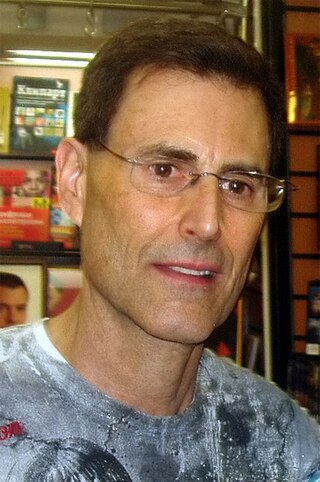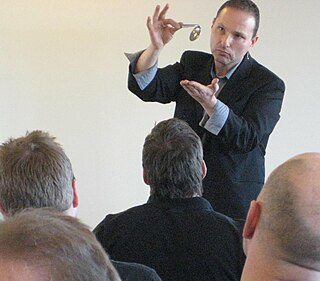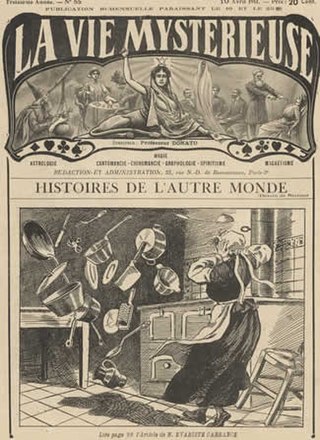
James Randi was a Canadian-American stage magician, author, and scientific skeptic who extensively challenged paranormal and pseudoscientific claims. He was the co-founder of the Committee for Skeptical Inquiry (CSI), and founder of the James Randi Educational Foundation (JREF). Randi began his career as a magician under the stage name The Amazing Randi and later chose to devote most of his time to investigating paranormal, occult, and supernatural claims. Randi retired from practicing magic at age 60, and from his foundation at 87.

The Committee for Skeptical Inquiry (CSI), formerly known as the Committee for the Scientific Investigation of Claims of the Paranormal (CSICOP), is a program within the U.S. non-profit organization Center for Inquiry (CFI), which seeks to "promote scientific inquiry, critical investigation, and the use of reason in examining controversial and extraordinary claims." Paul Kurtz proposed the establishment of CSICOP in 1976 as an independent non-profit organization, to counter what he regarded as an uncritical acceptance of, and support for, paranormal claims by both the media and society in general. Its philosophical position is one of scientific skepticism. CSI's fellows have included notable scientists, Nobel laureates, philosophers, psychologists, educators, and authors. It is headquartered in Amherst, New York.

Uri Geller is an Israeli-British illusionist, magician, television personality, and self-proclaimed psychic. He is known for his trademark television performances of spoon bending and other illusions. Geller uses conjuring tricks to simulate the effects of psychokinesis and telepathy. Geller's career as an entertainer has spanned more than four decades, with television shows and appearances in many countries. Magicians have called Geller a fraud because of his claims of possessing psychic powers.
Peter George Popoff is a German-born American televangelist, charlatan, debunked clairvoyant, and faith healer. He was exposed in 1986 by James Randi for using a concealed earpiece to receive radio messages from his wife, who gave him the names, addresses, and ailments of audience members during Popoff-led religious services. Popoff falsely claimed God revealed this information to him so that Popoff could cure them through faith healing.
Project Alpha was an effort by magician James Randi to test the quality of scientific rigor of a well-known test of paranormal phenomena.

Ray Hyman is a Professor Emeritus of Psychology at the University of Oregon in Eugene, Oregon, and a noted critic of parapsychology. Hyman, along with James Randi, Martin Gardner and Paul Kurtz, is one of the founders of the modern skeptical movement. He is the founder and leader of the Skeptic's Toolbox. Hyman serves on the Executive Council for the Committee for Skeptical Inquiry.

Spoon bending is the deformation of objects, especially metal cutlery, purportedly by paranormal means. It is a common theme for magic tricks, which use a variety of methods to produce the effect. Performers commonly use misdirection to draw their audience's attention away while the spoon is manually bent. Another method uses a metal spoon that has been prepared by repeatedly bending the spoon back and forth, weakening the material. Applying light pressure will then cause it to bend or break.

The Pigasus Award is the name of an annual tongue-in-cheek award, which was presented by the late James Randi, a skeptic. The purpose of the award was to expose parapsychological, paranormal, and psychic frauds whom Randi had noted over the previous year. Randi usually made his announcements of the awards from the previous year on April 1.

Andrija Puharich — born Henry Karel Puharić — was a medical and parapsychological researcher, medical inventor, physician and author, known as the person who brought Israeli Uri Geller and Dutch-born Peter Hurkos (1911–1988) to the United States for scientific investigation.

Thoughtography, also called projected thermography,psychic photography,nengraphy, and nensha(Japanese: 念写), is the claimed ability to "burn" images from one's mind onto surfaces such as photographic film by parapsychic means. While the term "thoughtography" has been in the English lexicon since 1913, the more recent term "projected thermography" is a neologism popularized in the 2002 American film The Ring, a remake of the 1998 Japanese horror film Ring.

The Faith Healers is a 1987 book by conjurer and skeptic James Randi. In this book, Randi documents his exploration of the world of faith healing, exposing the tricks that religious con artists use in their healing shows to fool the audience. Randi's expertise in performing stage magic and mentalism allowed him to easily identify the same techniques when used by con artists. Randi analyzes the methods used by A. A. Allen, Ernest Angley, Willard Fuller, WV Grant, Peter Popoff, Oral Roberts, Pat Robertson, Ralph DiOrio and others, exposing their tricks. Popoff was dramatically exposed as a fraud by Randi on The Tonight Show Starring Johnny Carson. Randi expended considerable effort contacting people who were supposedly cured by these faith-healers. He found there was a lot of disappointment and not a single verifiable case of healing. Randi describes the "calling out trick," the "wheelchair trick," the "leg-stretching trick," the "how many fingers trick," the "shotgun technique," as well as methods used to gain personal information about potential victims in the audience. He also describes methods used, often by mail, to convince people to make large donations.

The Truth About Uri Geller, originally published as The Magic of Uri Geller in 1975, is a 1982 book by magician and skeptic James Randi about alleged psychic Uri Geller.

Flim-Flam! Psychics, ESP, Unicorns, and Other Delusions is a 1980 book by magician and skeptic James Randi about paranormal, occult, and pseudoscience claims. The foreword is by science fiction author Isaac Asimov. Randi explores topics which he says that scientists and the media are too willing to promote without skepticism and proper expertise.

An Encyclopedia of Claims, Frauds, and Hoaxes of the Occult and Supernatural is a 1995 book by the conjuror and paranormal investigator James Randi, with a foreword by Arthur C. Clarke. It serves as a reference for a variety of topics within pseudoscience, the paranormal, and hoaxes. The Encyclopedia received generally positive reviews. In 2006, Randi made the work available free online.

Banachek is an English mentalist, magician, and "thought reader".

Telekinesis is a purported psychic ability allowing an individual to influence a physical system without physical interaction. Experiments to prove the existence of telekinesis have historically been criticized for lack of proper controls and repeatability. There is no reliable evidence that telekinesis is a real phenomenon, and the topic is generally regarded as pseudoscience.

James "Jim" Underdown has been the executive director of The Center for Inquiry (CFI) West in Los Angeles since 1999. The Center for Inquiry is a non-profit educational organization with headquarters in Amherst, New York, whose primary mission is to foster a secular society based on science, reason, freedom of inquiry, and humanist values. CFI West is the largest facility in the organization outside Amherst.

Henry Gordon was a Canadian author, journalist, magician and skeptic. He was the founder of the Ontario Skeptics and a fellow of the Committee for Skeptical Inquiry (CSI).

An Honest Liar is a 2014 biographical feature film documentary, directed and produced by Justin Weinstein and Tyler Measom, written by Weinstein, Greg O'Toole and Measom, produced through Left Turn Films, Pure Mutt Productions and Part2 Filmworks, and distributed by Abramorama. The film documents the life of former magician, escape artist, and skeptical educator James Randi, in particular the investigations through which he publicly exposed psychics, faith healers, and con-artists. The film also focuses on Randi's relationship with his partner of 25 years, José Alvarez, who at the time of filming, had been discovered to be living under a false identity, calling into question "whether Randi was the deceiver or the deceived."
Stanford Research Institute in Menlo Park, California carried out research on various phenomena characterized by the term parapsychology from 1972 until 1991. Early studies indicating that phenomena such as remote viewing and psychokinesis could be scientifically studied were published in such mainstream journals as Proceedings of the IEEE and Nature. This attracted the sponsorship of such groups as NASA and The Central Intelligence Agency.

















